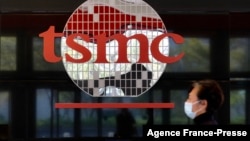Taiwan Semiconductor Manufacturing Company (TSMC), one of the world's largest chipmakers, has announced plans to build a new plant in Japan, a move experts say may help revive Japan's declining chipmaking sector and bolster its economic security.
The new plant is slated to begin operation in 2024, said CEO C.C. Wei,
who announced the expansion. The operation will expand TSMC's worldwide production while fostering Taiwan's economic ties to Japan, according to Yukan Fuji, a Japanese newspaper.
The move comes as Japanese manufacturers and others eye Beijing's intentions toward Taiwan, where most TSMC plants are located. Any disruption in Taiwan affecting TSMC production could strain the global supply chain to the snapping point.
"We have received strong commitment to supporting this project from our customers and the Japanese government," said Wei.
The Japanese government intends to subsidize about half of TSMC's roughly $8.81 billion project, according to TechTaiwan.
Kazuto Suzuki, a University of Tokyo professor who focuses on public policy, told VOA Mandarin that it is "very important" that "Sony and Toyota's parts manufacturer Denso is also invested in the joint construction. … Furthermore, TSMC's products are tailored to demand. With Sony's vast customer base, TSMC can establish a model of close communication with customers and create products with higher customer satisfaction."
TSMC's plans to build a new plant in Japan are part of its global expansion.
The chipmaker is already building a $12 billion facility in the U.S. state of Arizona, where production is expected to begin in 2024. The plant is slated to produce 5-nanometer chips, the latest in semiconductor technology.
Decreasing reliance on China
Expanding into Japan will bolster that country's chipmaking. "We expect our country's semiconductor industry to become more indispensable and self-reliant, making a major contribution to our economic security," Japanese Prime Minister Fumio Kishida told reporters on October 14, after TSMC's announcement.
"The increasingly tense relationship between Taiwan and China has increased geopolitical pressure on the supply chain, so the world is rebuilding the supply chain to break away from dependence on China," Ruay-Shiung Chang, president of the National Taipei University of Business, told VOA Mandarin.
"From the perspective of risk management, Western countries and China will inevitably be polarized in the future, and many industry standards may become interchangeable," he added.
Suzuki believes that TSMC's plan will make the company an "economic and trade friendship ambassador" to Japan as the economic link between Tokyo and Beijing deteriorates.
"Since the Trump administration, exports of semiconductors to China have been restricted. For example, Japan no longer cooperates with Huawei," he said, referring to the Chinese tech multinational targeted by the U.S. for its close ties to Beijing. "So regardless of whether TSMC enters Japan or not, the semiconductor industry ties between Japan and China are a big problem, and there is currently no solution."
Impact on other chipmaking countries
Nikkei Asia reported that if TSMC accepted financing from the Japanese government, South Korea and other countries could file complaints with the World Trade Organization (WTO), citing the loss of semiconductor exports to subsidized plants in Japan.
"How about South Korea's subsidies for its own domestic [chipmakers]?" Chang said. The South Korean government said in May that it plans to offer tax incentives and state subsidies worth a combined $453 billion to chipmakers to meet the government's goal of becoming a global leader in chip production, according to Yonhap, the South Korean news agency.
Chang pointed out that because TSMC is establishing a factory in Arizona, the U.S. would likely not support South Korea's filing against Japan at the WTO.
However, a country seeking to file a complaint with the WTO often encounters difficulty proving the connection between its projected losses and the subsidies provided by the possible defendant countries, Chang added. Without that direct link, an action cannot proceed.
"The U.S. and EU (European Union) regarded China's massive subsidies to support the semiconductor industry as a major issue, but they still failed to lodge a complaint with the WTO due to difficulties in producing evidence, " said Chang.
"From a global perspective, TSMC's establishment of a factory in Japan is of great help in increasing semiconductor supply capacity," Suzuki said.
Companies manufacturing chips solely for use in their own products is a model that market forces will eliminate, he added, and this will give TSMC, which makes chips usable by many manufacturers, a long-term advantage.
"However, the factory will not be fully operational until 2024, and there will be no immediate impact in the short term. The important thing is that Japan is not very dependent on Samsung's [chips] because they are designed and manufactured for Samsung's own products. Sony, Mitsubishi, Hitachi and other products rely on TSMC … more than Samsung, so the impact is very limited, " Suzuki said.




